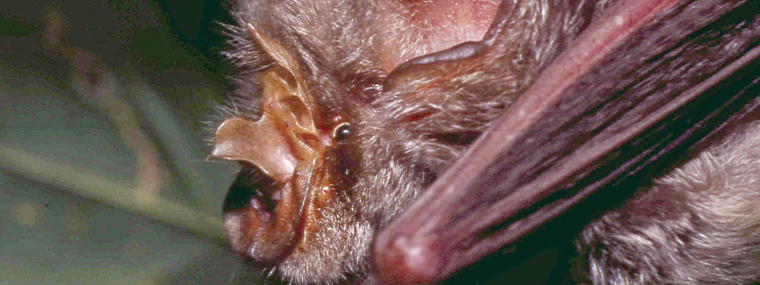
Bats and the Novel Coronavirus
By John Greenwood / Published August 2020

I
ntroduction and Context
Friends of Bats is a company focused solely and exclusively on safe, humane, effective, and guaranteed bat colony exclusion. We have been performing this service for our neighbors throughout Florida for more than two decades, and during all of this time we have been continually asked about the risk to human health from a bat colony infestation. Historically, people have been concerned primarily about rabies and histoplasmosis (both of which are very rare and are often blown out of proportion because of the fear they engender). Recently, we have been receiving more and more questions from our customers about the risk to people of contracting the current novel coronavirus from bat colonies roosting in their homes and buildings. Of course, issues like this are of interest to us not only in order to advise and protect our customers but also to protect our own technicians and their families. Therefore, I began to research the topic and the fruits of this work (taken from the best and most current science available) is set out and summarized below.
What is the Novel Coronavirus?
People tend to use the term coronavirus as a synonym for COVID-19, which is the strain of coronavirus that is causing the current pandemic. However, there are a vast number of types of different coronaviruses—potentially as many as there are bat species (over 1,000)—and while we think that the original host of the COVID-19 virus was a horseshoe bat, we know of no bat species that are able to transfer the disease directly to humans.
The novel coronavirus (also known as COVID-19 and SARS-CoV-2) is a zoonotic disease, which means it comes from a group of viruses that originate or spread in animals. According to Peter Ben Embarek (a WHO expert in animal diseases that cross the species barrier to humans), it is still uncertain which animal may have originally transmitted the disease to humans. However, the broad consensus within the international scientific community is that the virus probably arrived in humans through contact with animals raised to supply food and not from bats directly.
For example, SARS-CoV, which is the coronavirus that caused the severe acute respiratory syndrome (SARS) pandemic in 2003, is a close relative of SARS-CoV-2 and was also found to have been transmitted from bats to an intermediate host—the masked palm civet—which then subsequently infected the human population.
Similarly, MERS-CoV, the coronavirus that caused Middle East respiratory syndrome (MERS) in 2012, jumped from bats to another intermediate host, the dromedary camel, before infecting people.
Professor Yovel and Dr. Weinberg, who teach in the zoology department of Tel Aviv University’s life sciences faculty, summed it up in the following piece (Published in Haaretz):
Let’s start from the punch line: Bats did not give us the latest corona-virus. Nor were its notorious cousins SARS-1 or MERS, or even the ebola virus, transmitted from bats to humans… Science doesn’t yet know where the coronavirus lurked in wait for the past few years, or when it became dangerous to people, or when the first person was infected, nor do we know which animal infected that first human. The only thing science knows for sure is that the coronavirus isolated from the Chinese bat cannot have infected humans and isn’t dangerous to them.
Florida Bats and the Coronavirus
According to the Florida Bat Conservancy, Florida is home to 13 different species of bats that are either year-round or seasonal residents. All 13 species are insectivorous. That is to say that they eat small flying insects, including mosquitos, which is the primary reason the state protects them. The species of bat residents in the state of Florida are the following:
- Big brown bat
- Tricolored bat (Eastern pipistrelle)
- Evening bat
- Gray myotis
- Northern yellow bat
- Seminole bat
- Velvety free-tailed bat
- Brazilian free-tailed bat
- Eastern red bat
- Florida bonneted bat
- Hoary bat
- Rafinesque’s big-eared bat
- Southeastern myotis
The species of bat thought to have transmitted the virus to an intermediate host animal (possibly a pangolin, which is a small anteater) is a horseshoe bat (Rhinolophidae). Pangolins live only in Asia and in sub-Saharan Africa. Likewise, horseshoe bats are found only in the Old World, mostly in tropical or subtropical areas, including Africa, Asia, Europe, and Oceania. There are no horseshoe bats in Florida or anywhere in the Americas.
Conclusion
Camels, pangolins, and masked palm civets are not the only animals known to be able to transmit coronaviruses to humans. Studies have shown that even tigers, cats, ferrets, and also dogs are susceptible to COVID-19. In fact, ironically, the first two dogs known to have caught the coronavirus probably caught the disease from their owners, according to researchers in Hong Kong.
Fortunately, their study produced no evidence that dogs can spread the illness to other dogs or to humans, and veterinary epidemiologists doubt that canines in general are very susceptible to the virus.
Even more ironically, scientists are much more concerned about the possibility of humans infecting bats with coronaviruses than they are of the converse. Susanne Rust, an award-winning L.A. Times investigative reporter specializing in environmental issues, writes in an article entitled “Bats get blamed for the coronavirus. But bats face their own virus risk—from humans”:
“This month, the federal Fish and Wildlife Service sent out a directive advising scientists to suspend all bat studies, concerned that researchers could spread the disease to their already vulnerable study subjects.”
Because bats are not carriers (only hosts) of COVID-19 and play no role in the current spread of the disease directly to humans, harming bats will not save human lives and will do nothing to help protect or improve human health. Ironically, the only animals known for certain to spread COVID-19 to other humans are humans themselves.
John Greenwood
Technical Consultant, Friends of Bats
John Greenwood is the Technical Consultant for Friends of Bats—a State-wide, family-owned and family-operated company specializing exclusively in the safe, humane, and guaranteed exclusion of bat colonies. For more information, contact us at john@friendsofbats.com, visit www.friendsofbats.com, or call 1-888-758-BATS (2287).




